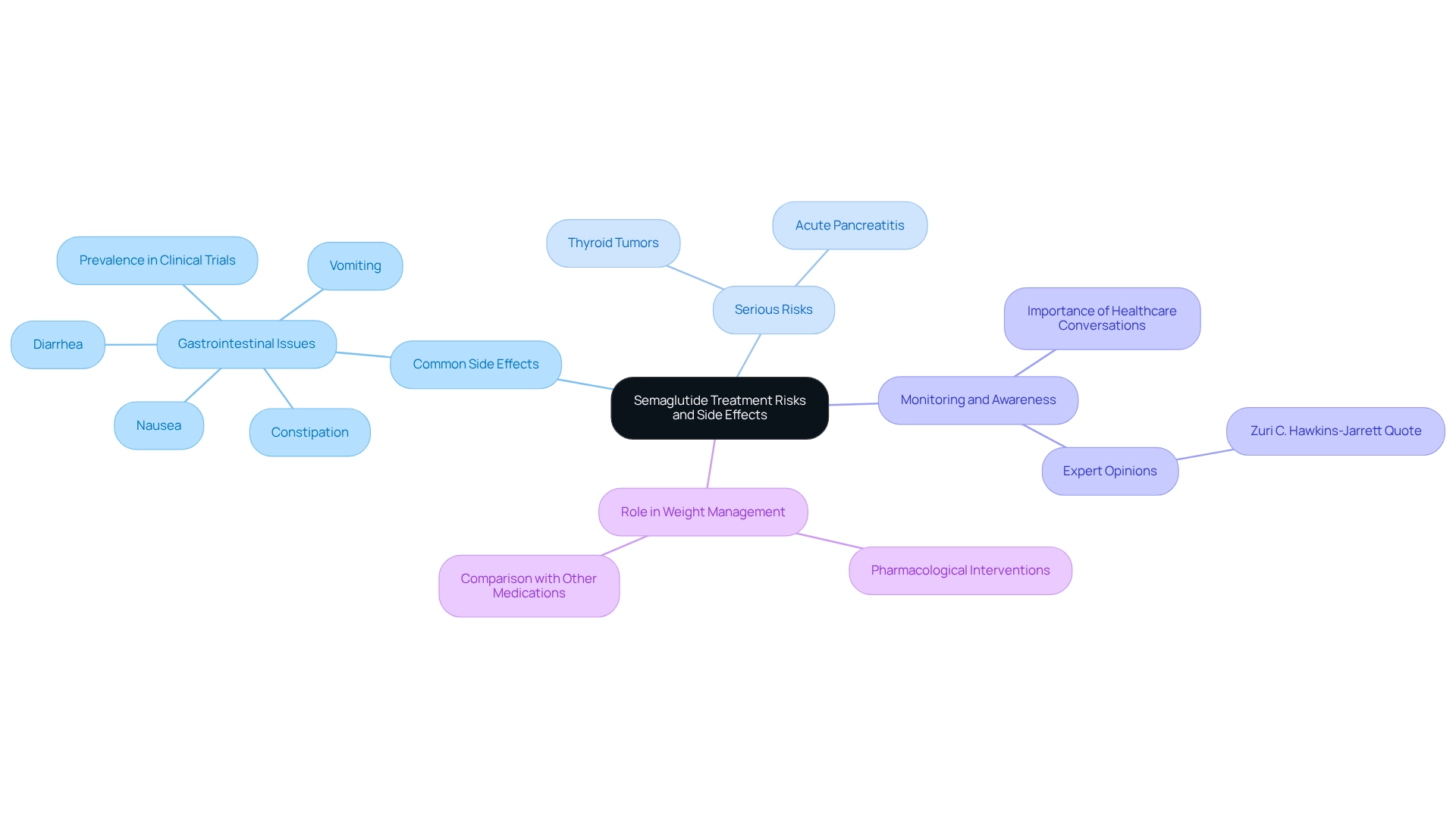Health Benefits of Semaglutide: Understanding Its Impact on Wellness
Overview
Semaglutide presents notable health benefits, particularly in effective weight management and improved cardiovascular health. This positions it as a significant advancement in the treatment of obesity. How does semaglutide achieve these results? The article elaborates on its mechanisms, including appetite reduction and enhanced insulin secretion. Clinical trial findings further demonstrate its efficacy in reducing body mass and lowering the risk of major cardiovascular events.
In addition, the implications of these findings are profound. By addressing key health issues, semaglutide not only aids individuals in managing their weight but also contributes to overall cardiovascular well-being. This dual benefit is crucial for those struggling with obesity-related health risks.
As a result, exploring semaglutide as a treatment option could be a transformative step for many. For those interested in learning more about the clinical evidence and potential applications of semaglutide, further resources are available to guide you on this journey towards better health.
Introduction
In the ongoing battle against obesity and its related health issues, semaglutide stands out as a groundbreaking treatment option that offers more than just weight loss. This glucagon-like peptide-1 (GLP-1) receptor agonist not only aids in managing type 2 diabetes but also provides significant cardiovascular and metabolic benefits.
As research continues to unveil its multifaceted advantages, including:
- Improved glycemic control
- Potential kidney protection
The implications for health management are profound. However, with its promising outcomes come essential considerations regarding side effects and suitability for various individuals. Understanding the full spectrum of semaglutide’s effects is crucial for those seeking effective solutions in their weight management journey.
Define Semaglutide and Its Role in Weight Management
Semaglutide serves as a glucagon-like peptide-1 (GLP-1) receptor agonist, which plays a crucial role in managing type 2 diabetes and illustrates the health benefits of semaglutide in the long-term management of body mass. By mimicking the natural GLP-1 hormone released in the gut during food consumption, this medication activates GLP-1 receptors, leading to various physiological effects: increased insulin secretion, reduced glucagon release, and delayed gastric emptying. Together, these actions contribute to decreased appetite and enhanced satiety, establishing this medication as a strong ally in body mass management strategies.
Recent studies indicate that individuals utilizing semaglutide can achieve significant body mass loss, highlighting the health benefits of semaglutide, especially when combined with lifestyle changes such as diet and exercise. Notably, the STEP 5 trial, officially titled ‘Trial Design and Methodology of STEP 5,’ was a phase 3 randomized, double-blind, placebo-controlled study aimed at thoroughly assessing the medication’s impacts on body mass management. The trial demonstrated the health benefits of semaglutide in managing obesity, showcasing high adherence rates and robust data collection that support its reliability.
Current statistics reveal a significant increase in the use of this medication, with ongoing research focused on determining optimal dosages for long-term weight maintenance. Furthermore, COVID-19 infection was reported in 10.5% of participants receiving the treatment, compared to 5.3% in the placebo group, underscoring the importance of understanding its safety profile in today’s medical landscape. As the field of obesity care evolves, the health benefits of semaglutide represent a significant advancement, comparable to the impact of sleeve gastrectomy introduced in 2007. As one expert noted, “It’s big. It’s a change we’ve not had in obesity care since sleeve gastrectomy started in 2007.
Explore Health Benefits of Semaglutide Beyond Weight Loss
Semaglutide is recognized not only for its weight loss effects but also for the health benefits of semaglutide, particularly in supporting cardiovascular wellness. Recent studies have demonstrated that this medication can notably reduce the risk of major adverse cardiovascular events, including heart attacks and strokes.
While a marked improvement in cardiovascular wellness metrics has been observed, it is crucial to clarify that the average decrease in the Apnoea-Hypopnea Index (AHI) pertains to liraglutide, not to another medication. This distinction underscores the need for precise representation of each drug’s effect on heart function, emphasizing the health benefits of semaglutide alongside its vital role in metabolic health.
It has been shown to improve blood sugar control, which is essential for individuals managing diabetes. Furthermore, emerging evidence suggests that this medication may have a positive impact on kidney function, providing additional protective benefits for patients at risk of renal complications, while the health benefits of semaglutide also extend to alleviating symptoms associated with heart failure, thereby enhancing the quality of life for individuals struggling with obesity or diabetes.
As highlighted by Valeria Guglielmi, a phenotype-guided strategy for obesity management that incorporates specific medications has been linked to greater weight loss and improved well-being. This multifaceted approach not only targets weight management but also highlights the health benefits of semaglutide in prioritizing cardiovascular health, positioning it as a valuable component of comprehensive wellness strategies.
Explain How Semaglutide Works in the Body
Semaglutide operates by mimicking the action of the GLP-1 hormone, which is crucial for regulating glucose metabolism and appetite. Upon administration, this medication binds to GLP-1 receptors in the pancreas, prompting insulin secretion in response to increased blood glucose levels. This action is complemented by the inhibition of glucagon secretion, which further aids in lowering blood sugar levels. Furthermore, this medication slows gastric emptying, resulting in prolonged feelings of fullness and reduced food intake. This multifaceted approach not only aids in weight loss but also showcases the health benefits of semaglutide by improving glycemic control and overall metabolic health.
In practical terms, individuals utilizing the medication have reported considerable weight loss, with one case study showcasing a participant who shed 35 pounds over a year while adhering to a nutritious eating plan and consistent physical activity. This highlights the potential for sustainable management of body weight when semaglutide is paired with lifestyle changes. As the FDA recommends Wegovy for individuals with a BMI of 30 kg/m² or greater, the health benefits of semaglutide in managing weight and improving metabolic health are increasingly recognized in clinical settings. Dr. Amanda Velasquez emphasizes, “Collaborating closely with your healthcare provider to manage your care plan can help you achieve the best results.” Additionally, it is crucial to highlight that the medication is sold under the names Ozempic and Wegovy, offering users choices for their care.
Assess Risks and Side Effects of Semaglutide Treatment
Semaglutide, like any medication, carries potential side effects that users should be aware of. Commonly reported adverse effects include gastrointestinal issues such as nausea, vomiting, diarrhea, and constipation. These symptoms are generally mild to moderate and may decrease over time as the body adjusts to the therapy. However, more serious risks exist, including the potential for thyroid tumors and acute pancreatitis.
Recent findings indicate that gastrointestinal issues are prevalent among users, with a notable incidence reported in clinical trials. For instance, a change in diastolic blood pressure from baseline to week 68 was recorded at -0.42 mm Hg in the placebo group, highlighting the importance of monitoring these effects. It is essential for individuals contemplating the medication to participate in comprehensive conversations with their healthcare professionals to assess these risks and decide if this option aligns with their health goals.
As Zuri C. Hawkins-Jarrett, PharmD, MPH, BCPS, notes, “Ozempic can affect many different organs and systems in the body,” emphasizing the need for awareness of its broader impacts. Expert opinions highlight the importance of monitoring for these side effects, ensuring that patients are well-informed and prepared for their treatment journey.
Moreover, the role of pharmacological treatments in tackling obesity underscores the importance of this medication in weight management, particularly the health benefits of semaglutide, making it crucial for users to comprehend both its advantages and risks.

Identify Who Can Benefit from Semaglutide Therapy
Semaglutide therapy primarily targets adults with obesity, defined by a body mass index (BMI) of 30 or higher. It is also suitable for individuals who are overweight, with a BMI of 27 or more, provided they have at least one weight-related medical condition such as type 2 diabetes, hypertension, or dyslipidemia. Additionally, those looking to enhance their metabolic health and lower their risk of cardiovascular disease may find that the health benefits of semaglutide are particularly beneficial.
It is essential for potential users to consult healthcare professionals to assess their eligibility and address any underlying health issues that could influence their treatment options. As of 2025, approximately 38.9% of the population lacks higher education, which may affect their comprehension of such therapies. This educational gap can impede informed decision-making regarding obesity solutions, highlighting the necessity for clear communication from healthcare providers.
Insights from the case study “Future Directions for Obesity Management” suggest the exploration of alternative weight maintenance strategies and the potential for generic GLP-1 receptor agonists to improve accessibility. Nathan D. Wong points out that when using STEP 1 eligibility criteria to identify suitable participants, differences may exist between these individuals and those involved in clinical trials. Furthermore, while compounded GLP-1 receptor agonists are available at lower prices, their safety and efficacy remain unverified, an important consideration for anyone evaluating treatment options.
Conclusion
Semaglutide emerges as a transformative option in the fight against obesity, offering benefits that extend far beyond weight loss. By mimicking the GLP-1 hormone, it effectively enhances insulin secretion, suppresses glucagon, and slows gastric emptying. These actions lead to improved glycemic control and significant weight reduction. The results from rigorous studies, including the STEP trials, highlight its efficacy and the potential for sustainable weight management, especially when combined with lifestyle changes.
Furthermore, the health benefits of semaglutide encompass vital cardiovascular and metabolic improvements. The drug has shown promise in reducing the risk of major cardiovascular events and may even offer protective effects for kidney function. This multifaceted approach positions semaglutide not only as a weight management tool but also as an integral part of broader health strategies for individuals managing type 2 diabetes and obesity.
However, it is essential to remain vigilant about the potential side effects associated with semaglutide, including gastrointestinal issues and more serious risks like thyroid tumors. Open dialogue with healthcare providers is crucial for anyone considering this treatment, ensuring that they are well-informed about both the benefits and risks involved.
Ultimately, semaglutide represents a significant advancement in obesity treatment, offering hope for many struggling with excess weight and its associated health complications. As the landscape of obesity management evolves, understanding the full spectrum of semaglutide’s effects will empower individuals to make informed decisions about their health journey.
Frequently Asked Questions
What is semaglutide and how does it work?
Semaglutide is a glucagon-like peptide-1 (GLP-1) receptor agonist that helps manage type 2 diabetes. It mimics the natural GLP-1 hormone released in the gut during food consumption, activating GLP-1 receptors to increase insulin secretion, reduce glucagon release, and delay gastric emptying, which together decrease appetite and enhance satiety.
What are the health benefits of semaglutide in body mass management?
Semaglutide has been shown to facilitate significant body mass loss, especially when combined with lifestyle changes like diet and exercise. It is recognized as a strong ally in body mass management strategies.
What was the STEP 5 trial and what did it demonstrate?
The STEP 5 trial was a phase 3 randomized, double-blind, placebo-controlled study designed to assess the impacts of semaglutide on body mass management. It demonstrated the health benefits of semaglutide in managing obesity, with high adherence rates and robust data supporting its reliability.
How does semaglutide affect cardiovascular wellness?
Semaglutide has been shown to reduce the risk of major adverse cardiovascular events, such as heart attacks and strokes, indicating its positive impact on cardiovascular wellness.
What other health benefits does semaglutide provide?
In addition to weight loss and cardiovascular benefits, semaglutide improves blood sugar control, may positively impact kidney function, and can alleviate symptoms associated with heart failure, enhancing the quality of life for individuals with obesity or diabetes.
What is the significance of the findings regarding the Apnoea-Hypopnea Index (AHI)?
It is important to note that the average decrease in the Apnoea-Hypopnea Index (AHI) pertains to liraglutide, not semaglutide. This distinction emphasizes the need for accurate representation of each medication’s effects on heart function.
How does a phenotype-guided strategy relate to semaglutide?
A phenotype-guided strategy for obesity management that includes specific medications like semaglutide has been linked to greater weight loss and improved well-being, highlighting its role in prioritizing cardiovascular health within comprehensive wellness strategies.






